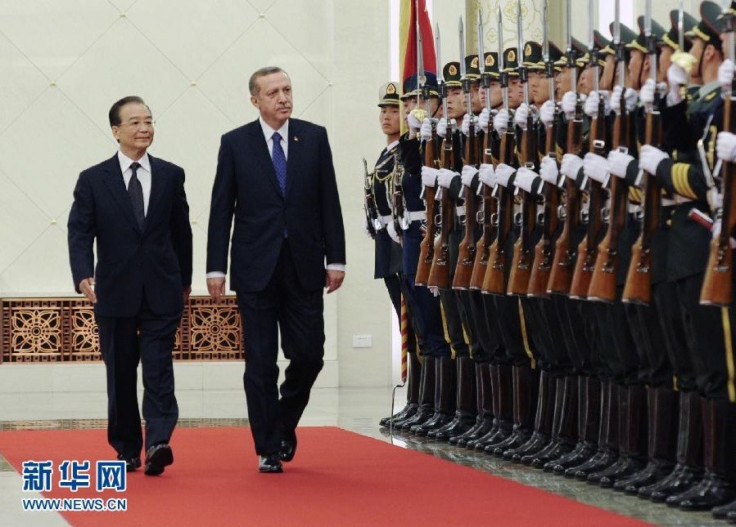Turkey and China Strengthen Relations With Historic Visit

Turkish Prime Minister Recep Tayyip Erdogan is halfway through a historic visit to China, the first by a Turkish head of government in 27 years.
Erdogan's first stop Sunday on his four-day-long visit was to Urumqi, the capital of China's Xinjiang province that borders numerous Central Asian states.
No Turkish PM has ever visited Xinjiang, although Turkey has a strong connection to Central Asia's numerous Turkic ethnic groups.
Xinjiang In The Spotlight
Xinjiang is an ethnically diverse and resource-rich region, a place long associated with trans-Eurasian trade. It was traverse by bthe ancient Silk Road, and it is home to the Uyghurs, a Turkic-speaking, Muslim ethnic group.
China has pushed hard over recent years to transform urban centers in Xinjiang, particularly the cities of Urumqi and Kashgar, into economic hubs, hoping to develop trade with Central Asia's Turkic-speaking nations as well as countries in South Asia.
Xinjiang is also increasingly becoming host to many of China's national-level infrastructure and industrial development projects, largely related to energy development and transport.
In recent years, tensions between Uyghurs and China's dominant Han ethnic group, with different languages, religions, and customs, has resulted in turbulence amid surging regional economic growth. China blames separatist groups and what it calls terrorists and political enemies abroad for inciting violence and disturbances against the government.
The current trip is a sign of Turkey's increasing interest in advancing economic opportunities with China.
Erdogan arrived with a massive 300-member business delegation, and expressed hopes of investing into a new industrial development zone in Xinjiang.
Turkey is pushing China to increase investment in the country and cooperation in the automotive, banking, and telecommunications sectors.
Trade between the two countries is estimated to reach $100 billion by 2020.
Political Difficulties
In the past, Erdogan enticed resentment from Beijing through his publicized comments on ethnic strife and unrest in China's west.
Responding to deadly Han-Uyghur ethnic unrest in 2009, the Turkish PM equated it to genocide.
Turkey's Industry Minister also created controversy in 2009 by calling for a boycott of Chinese goods because of the unrest.
Although Erdogan's arrival in China is a demonstration of warming relations and new interest, the two countries still have a number of political frictions.
At Odds Over Syria
While China continues to back Syrian president Bashar al-Assad in the U.N. Security Council, Turkey has voiced opposition and warnings to its neighbor Syria for its military actions against rebel groups.
The Turkish PM arrived in Beijing on Monday, meeting with Chinese leaders and Premier Wen Jiabao.
Western media has speculated that the leadership of the two countries will be discussing the continued uprising in Syria behind closed doors, but there was no indication in public of either agreement or disagreement on the issue from Chinese and Turkish leaders.
Erdogan will visit Shanghai, China's financial and banking hub, after the capital, and will deliver a speech at the prestigious Shanghai International Studies University.
Wen stated to reporters on Monday that continuing to strengthen Sino-Turkish friendship and cooperation is a common hope and told his Turkish counterpart that I am confident your visit will be a further step in increasing understanding and trust between both sides, and for injecting new energy into our bilateral relations.
© Copyright IBTimes 2024. All rights reserved.





















